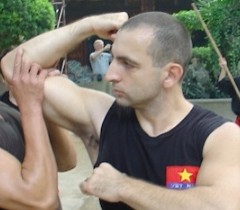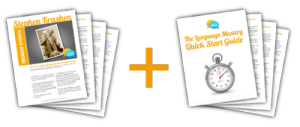Why Grammar-based Instruction is Bunk
In recent years, grammar mavens and traditional language educators have been up in arms against a perceived attack on “the righteous study of grammar”. These defensive claims always perplex me considering that nearly all language classes still spend the vast majority of class hours teaching and testing grammar rules…
Review of Rosetta Stone
With $210,000,000 in sales last year, Rosetta Stone is far and away the best selling language learning product on the market today. But Rosetta Stone’s sales figures say more about the company’s marketing budget than the quality of their products. A quick look around the web reveals a healthy mix of positive and negative feedback about the product, but there is a big problem with objectivity: the positive reviews tend to...
Interview with Steve Kaufmann, Founder of LingQ.com
With 11 languages under his belt, Steve Kaufmann is an extremely accomplished language learner. His extensive language learning wisdom in shared in his book titled The Way of the Linguist: A Language Learning Odyssey and his online language learning system called LingQ. In the interview, we discuss what Steve believes to be the 7 most common misconceptions about language learning, how to learn Mandarin effectively, and the role of a good teacher.
The Power of Mindmapping in Language Learning
The first thing I’d like to say about mind mapping is how upset I am for not knowing about it sooner! Why wasn’t it taught to me in elementary school, junior high, high school, or even university? Why did I labor through so many classes, books and professional challenges without this amazing tool? Oh well, at least a little angel introduced the concept to me before it was too late… (Thanks Kim!) Mind mapping is...
Interview with Antonio Graceffo: Writer, Fighter, Linguist
In this interview with Antonio Graceffo, he “pulls no punches” (pun intended) when sharing his views on how to learn a foreign language effectively. His language learning wisdom stems from formal training as an interpreter and translator at Germany’s prestigious University of Mainz, coupled with over a decade of living, learning, and working in South and East Asia.
Do Schools Kill Creativity?
In his thought provoking and entertaining TED Talk, Sir Ken Robinson (speaker, international advisor on education, and author of The Element: How Finding Your Passion Changes Everything) argues that schools stifle creativity by focusing too much on only a few of the human mind’s many kinds of intelligence. While not specifically related to language learning, I think Sir Ken Robinson’s suggestions about educational reform...
Multiple Intelligences and Language Learning
The term “Multiple Intelligences” was first coined by Harvard psychologist Howard Gardner. His theory is spelled out in the 1983 book, Frames of Mind: The Theory of Multiple Intelligences. In the book, Gardner posits that humans possess many varied types of intelligence, not just one. This stands in stark contrast to IQ and standardized testing, both of which look at intelligence as a one-dimensional concept: you either have it or you don’t. While Gardners’s work is still somewhat controversial, I think it is a helpful way to frame intelligence and useful tool for choosing effective language learning methods and materials for oneself.
Interview with Michael Heim
Michael Heim (1943-2012) was a highly respected professor of Slavic languages at UCLA. He spoke 10 languages (though he claimed that the number is hard to tie down due to the slippery political nature of language-dialect distinctions). Heim believed that effective language learning must begin (and progress) with a specific purpose in mind; he never learned a language just for the heck of it.
Review of LingQ.com
Pronounced like the word “link” (not “ling-kyu” as it is often mispronounced), LingQ is an an online and iOS app based language learning system created by Steve Kaufmann. The “freemium” site allows users to easily look up and save unknown words and phrases (what they call “LingQing”, hence the name of the site)m with tools for 11 languages: Chinese (Mandarin), English, French, German, Italian, Japanese, Korean, Portuguese, Russian, Spanish, and Swedish (which happen to be the same 11 languages Steve speaks).















